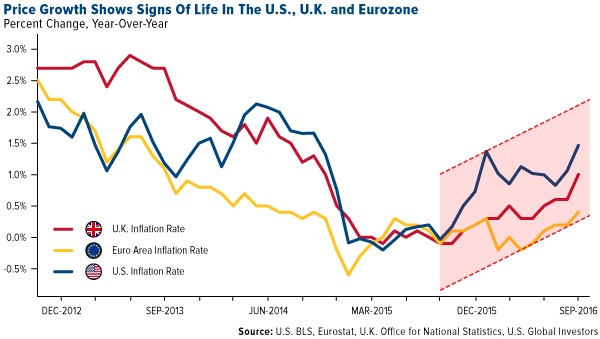The Potential Drivers For Gold Demand In China And India
Strengths
- The best performing precious metal for the week was platinum with a price surge of 5.09 percent. On Tuesday, South African news reported that plans are underway to manufacture more forklifts powered by hydrogen for local and international markets. Legislation in 2007 created the Hydrogen South Africa Strategy to develop vehicles powered by hydrogen through the utilization of the country’s platinum group metal resources.
- In a drop that could signal a buying opportunity, the net-long position in gold futures and options held by hedge funds and large speculators fell to the smallest level in more than seven months, in the third straight week of contraction. China raised bullion imports from Hong Kong for the first time in four months in September, according to data from the Hong Kong Census and Statistics Department. Investors have sought to diversify their assets while facing a weakening yuan. Net purchases were 44.9 metric tons, compared to 41.9 tons in August.
- This weekend is a key time for gold demand, with the Hindu festival of Diwali and Dhanteras on October 28, which is considered the most auspicious day of the year to buy gold. Goldman Sachs also noted that Chinese demand has potential to rise if the yuan continues to decline. Also supporting the potential for strong demand is the Indian government’s consideration of reducing its import tax on gold to 6 percent from 10 percent. This decision may take place in the third week of November.
Weaknesses
- The worst performing precious metal for the week was palladium, the only precious metal that recorded a loss for the week, with a decline of 0.55 percent. Physical demand could be weakening as it was reported in Canada that automobile and parts dealers sales declined 0.5 percent in August, the third consecutive monthly decline. In addition, S&P Global Ratings noted that in the U.S., subprime borrowers are falling behind on car loan payments at the highest rate in more than six years.
- Gold prices have been stuck in a narrow trading range of less than 3 percent, the tightest range in three years. Although physical demand in India has picked up ahead of festivals and the wedding season, investors are wary of picking up more gold while awaiting the expected interest rate increase by the Federal Reserve. Approaching the end of the month, gold may be headed for the biggest monthly drop since May.
- Gold consumption in India is set to shrink to the smallest level in seven years, at 650 metric tons. This is a significant drop, compared to 864 tons last year, and 1,006 tons in 2010. Marwhan Shakarchi, of MKS (Switzerland) SA, a Geneva-based refiner and trader, said, “In my 33 years in the market, physical demand has never been this dead.” Although gold prices have dropped about 8 percent from the two-year high in July, they are still up 20 percent this year.
Opportunities
- Platinum could get a boost from a new breed of electric vehicle. Toyota has released a new type of electric vehicle the company is calling the Mirai. Its energy is stored in a hydrogen tank rather than a battery, with a refueling time of just five minutes. With a price tag of over $50,000, Toyota expects to sell 1,000 of the vehicles this year and 3,000 in 2017. The key advantage is short refueling time relative to electric vehicles which rely on a battery power source to store energy.
- Goldman has reiterated its view that any sell-off substantially below $1,250 an ounce should be seen as a buying opportunity. Gold demand may be spurred by weakness in China’s currency and concerns over the nation’s property market. In addition, global inflation expectations have risen to the highest level since May 2015. Investors anticipate annual consumer inflation of 1.4 percent. Gold is traditionally used as a hedge against inflation.
- Mark Mobius, executive chairman of Templeton Emerging Markets Group, says he thinks gold will gain as much as 15 percent through 2017, as the Fed increases rates slowly and the dollar remains subdued. “The U.S. dollar is not that strong and may even decline,” said Mobius.
Threats
- The rush into higher-yielding, long-term bonds in recent years has become an extremely crowded trade. Money managers have noted that the prospect of rising inflation, and with high duration levels, investors may be facing steep losses in bonds.

- An ongoing legal dispute between Avocet Mining Plc and former workers from the Burkina Faso-located mine has resulted in $3.4 million of gold being seized from the mine, and the company’s shares have slumped by the most in a year, as much as 24 percent. In related news, Randgold made a $25 million advance payment to the government of Mali in their tax dispute ahead of talks to resolve the issue of alleged back taxes owed to the country.
- Chinese billionaire and Alibaba founder Jack Ma has proposed that Chinese government security should use big data to prevent crime. A draft cybersecurity law would grant the government nearly unlimited access to user data in the name of national security. Anti-terror laws that went into effect on January 1 allow authorities access to bank accounts, telecommunications and a national network of surveillance cameras called Skynet. Hmm, do you think someone did not get the English-Chinese translation of “Skynet” correct when the Terminator movies were imported? Recently, Twitter and Facebook cut off Geofeedia who was marketing aggregated user tweets and posts to provide local intelligence to law enforcement--even parsed down to zip codes or physical locations on its users.
Courtesy of http://usfunds.com/






 Frank Holmes is the CEO and Chief Investment Officer of
Frank Holmes is the CEO and Chief Investment Officer of 









